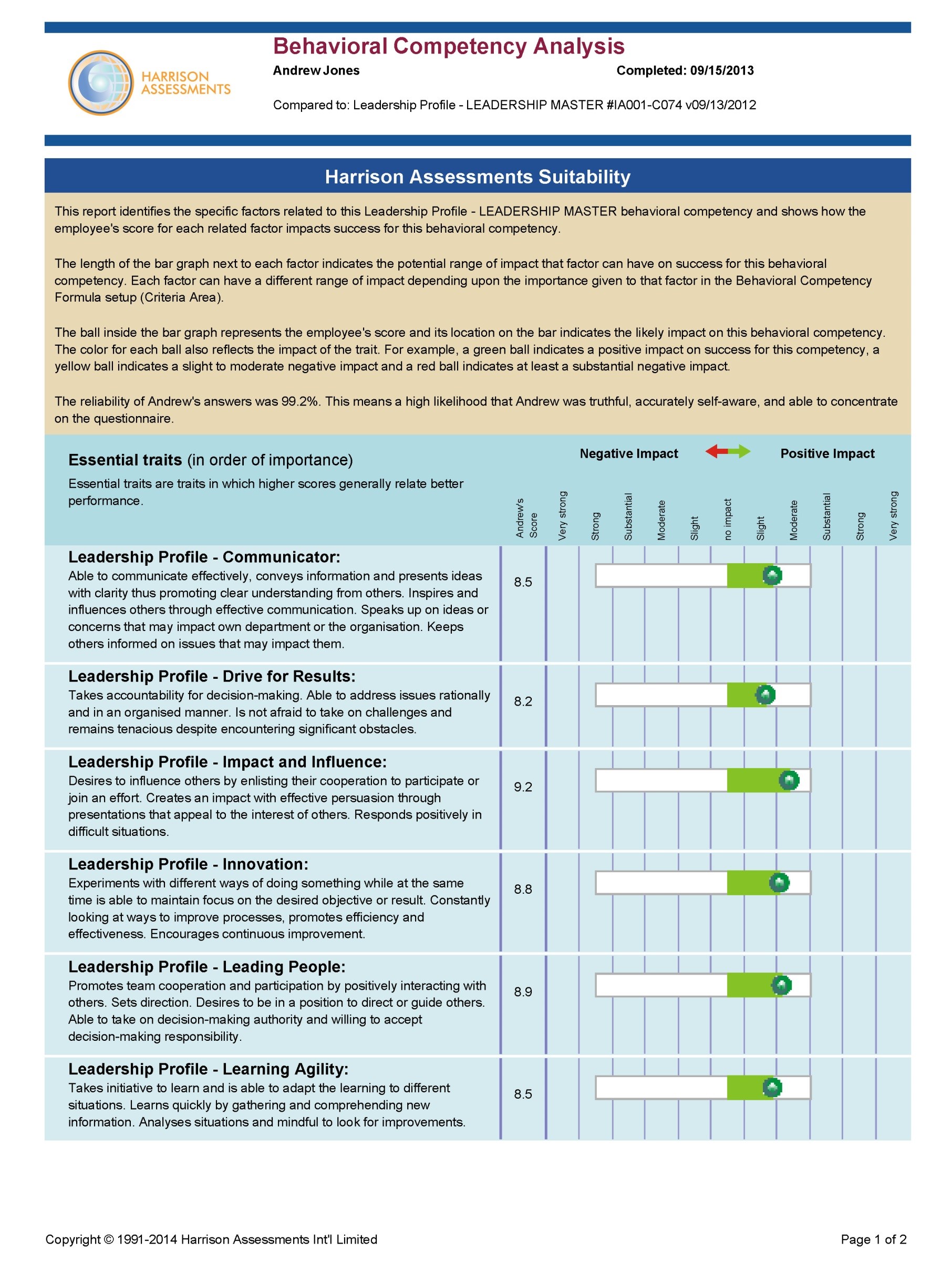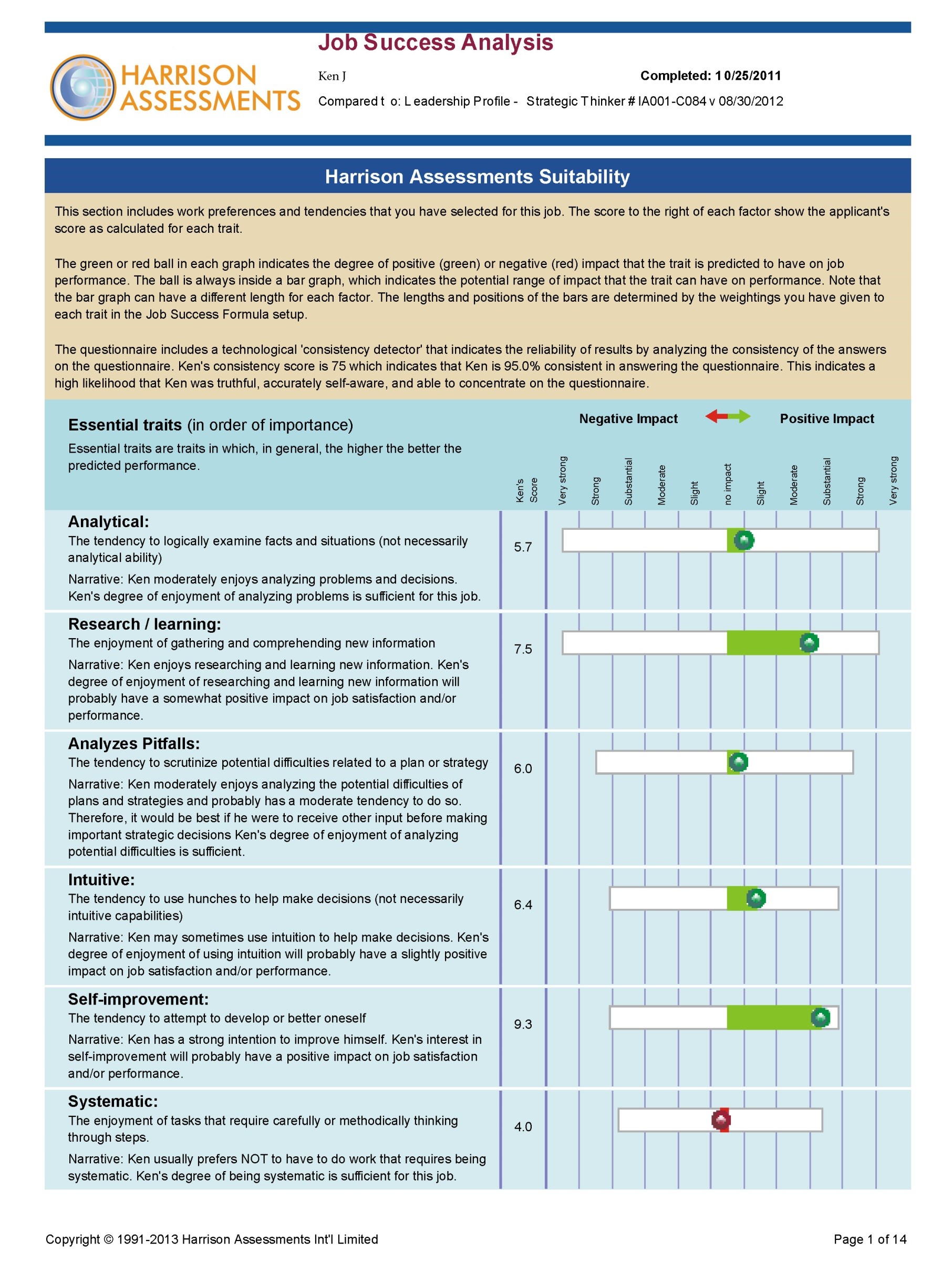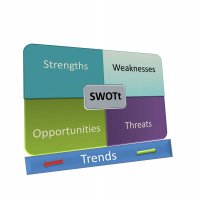Standard Behavioral Competencies
Harrison Assessments provides standard behavioral competencies that enable you to compare employees or applicants behavioral tendencies to the standard behavioral competencies. Behavioral competencies can also be customized to reflect your specific core values or core competencies.
JUDGMENT (STRATEGIC)
The tendency to have a balance of traits necessary to discern pertinent information, and formulate an effective strategy. Essential traits: Analytical, Analyzes Pitfalls, Research/Learning, Intuitive, Collaborative, Self-improvement, Systematic. Desirable traits: Experimenting, Persistent, Certain, Pressure Tolerance, Optimistic, Planning, Self-Acceptance, Relaxed and Open/Reflective. Traits to avoid: Blindly Optimistic, Impulsive, Skeptical, Defensive, Dogmatic, Easily Influenced, Fast but Imprecise and Precise but Slow.
DOESN'T NEED STRUCTURE
The tendency to manifest the traits that would enable one to occupy a position that does not have much structure (assuming sufficient job related knowledge). Essential traits: Takes Initiative, a low score on Tolerance of Structure (lack of desire for structure), Authoritative, Wants Autonomy. Desirable traits: Wants Challenge, Experimenting, Open /Reflective, Enthusiastic. Traits to avoid: Rebellious Autonomy, Blindly Optimistic, and Impulsiveness.
EFFECTIVE ENFORCING
The tendency to skillfully correct others when they are violating rules or performing poorly. Essential traits: Enforcing, Assertive, Frank, Diplomatic, Influencing, Tolerance of Bluntness. Desirable traits: Authoritative, Flexible, Optimistic, Self-Acceptance, Warmth/Empathy, Helpful, Open/Reflective, Relaxed. Traits to avoid: Blunt, Defensive, Dogmatic, Evasive, Forceful Enforcing, Permissive, Self-Sacrificing, Harsh and Authoritarian.
INNOVATIVE
The tendency to create new and more effective ways of doing things. Essential traits: Experimenting, Persistent, Takes Initiative, Enthusiastic, Open/Reflective, Research/Learning, Analytical, Optimistic. Desirable trait: Collaborative.
PROVIDES DIRECTION
The tendency to manifest the traits necessary for a leadership role. Essential traits: Wants to Lead, Influencing, Takes Initiative, Wants Challenge, Enthusiastic, Self-Improvement, Planning, Persistent, Pressure Tolerance, Public Speaking, Self-Acceptance. Desirable traits: Experimenting, Flexible, Frank, Handles Conflict, Helpful, Precise, Organized, Relaxed, Risking, Systematic, Tolerance of Bluntness, Warmth/Empathy.
INTERPERSONAL SKILLS
The tendency to have a balance of traits that relate to effective interaction with others. Essential traits: Diplomatic, Helpful, Optimistic, Outgoing, Assertive, Frank, Influencing, Self-Acceptance, Self-Improvement, Warmth Empathy, Tolerance of Bluntness. Desirable traits: Flexible, Collaborative, Open/Reflective, Manages Stress Well, Relaxed. Traits to avoid: Defensive, Blunt, Dogmatic, Harsh, Dominating, Authoritarian and Permissive.
HANDLES CONFLICT
The tendency to skillfully face discord or strife, and the interpersonal skills necessary to deal with it effectively. Essential traits: Comfort with Conflict, Diplomatic, Helpful, Warmth/Empathy and Assertive. Desirable traits: Collaborative, Self-Acceptance, Self-Improvement. Traits to avoid: Defensive, Authoritarian, Blunt, Dogmatic, Dominating, Harsh, Self-Critical, Wants Diplomacy.
RECEIVES CORRECTION
The tendency to accept guidance intended to improve performance. Essential traits: Self-Improvement, Interpersonal Skills, Self-Acceptance. Traits to avoid: Defensive, Dogmatic, Ego-defensive.
PEOPLE ORIENTED
The tendency to have a balance of traits that would enable one to positively interact with others. Essential traits: Warmth/Empathy, Helpful, Outgoing, Team (wants), Public Contact, Enthusiastic. Desirable trait: Self-Acceptance. Traits to avoid: Defensive, Dogmatic, Harsh, Dominating.
ORGANIZATIONAL COMPATIBILITY
The tendency to work co-operatively with others (assuming sufficient job related knowledge and team compatibility). Essential traits: Takes Initiative, Self-Improvement, Manages Stress Well, Diplomatic, Helpful, Warmth/Empathy, Optimistic, Team (wants) and Tolerance of Bluntness. Desirable traits: Tolerance of Structure, Self-Motivated,
COACHING
Is designed for people in positions who predominantly do coaching. Essential traits: Self-improvement, Diplomatic, Enlist Cooperation, Enthusiastic, Helpful, Optimistic, Warmth/Empathy. Desirable traits: Collaborative, Self-acceptance, Takes Initiative, Wants Challenge, Experimenting, Cause Motivated, Analytical, Frank, Manages Stress Well, Open/Reflective, Relaxed, Influencing, Outgoing, Teaching, Tolerance of Bluntness. Traits to avoid: Defensive, Dogmatic, Harsh, Blunt, Dominating and Permissive.
HANDLES AUTONOMY
The tendency to have the motivation and self-reliance necessary for a significant amount of independence from immediate supervision (does not indicate the necessary job related knowledge). Essential traits: Takes Initiative, Authoritative, Self-Motivated, Wants Autonomy, Persistent. Desirable trait: Optimistic. Trait to avoid: Rebellious Autonomy.
TOLERANCE OF EVASIVENESS
The level of comfort related to dealing with people who are indirect or lacking in frankness. Essential traits: Warmth/Empathy, Wants Diplomacy and Diplomatic. Desirable traits: Manages Stress Well, Relaxed. Traits to avoid: Blunt, Defensive, Dominating, Harsh.
SELF-EMPLOYED
The tendency to enjoy activities that would be required for self-employment (does not necessarily indicate sufficient business related knowledge). Essential traits: Authoritative, Takes Initiative, Wants Autonomy, Wants Challenge, Enthusiastic, Organized, Persistent, Analytical. Traits to avoid: Blindly Optimistic, Impulsive.
NEGOTIATING
The tendency to bargain in order to reach a beneficial agreement. Essential traits: Influencing, Interpersonal Skills, Diplomatic, Effective Enforcing, Assertive, Certain, Comfort with Conflict, Open/Reflective. Desirable traits: Frank, Experimenting. Traits to avoid: Permissive, Defensive, Self-Sacrificing, Blunt, Dogmatic and Harsh.
• There is also a 8 leadership competency profiles that are now in beta testing and these will be available in early 2015.
Customized Behavioral Competencies
Behavior competency/core value templates
The templates are extremely useful to capture an organization’s competencies and/or core values. Each employee can assess themselves against the appropriate behavioral competencies to obtain a clear understanding of his/her behavior patterns in relationship to that competency. This will enable the employee to see more clearly how to proceed in order to obtain that competency or core value.
The development reports can also be used in conjunction with this process in order to help guide the employee to a development plan and cultivate the particular traits that will support the required behavioral competencies or core values. You can also use a behavioral competency/core value template for screening as part of the selection process.
First, it is important to obtain an overview of how you might benefit from developing behavioral competency/core value templates. In general, there are two things you need to decide before developing behavioral competency or core value templates:
1. How are you going to use it – to which roles, position levels or organizational units do you want to apply it?
2. Do you wish to create a single template with traits that capture all the related behavioral competencies or core values for a role/level, or do you wish to create individual competencies using the different trait options and then use the “sub-competencies” or “sub-values” themselves as part of an overall behavioral competency template?
When making a behavior competency or core value template, you need to consider how it will be used. If the template will be used for different levels of the organization, you probably need to make at least two corresponding templates for that same behavioral competency or core value. You may even need to make one for each of five or six job families if you wish to apply it to all employees.
There are some cases where you may be able to create a behavioral competency/core value for managers that will also apply to professional or sales positions. For example, a template that focuses on initiative, achievement, or “results orientation” can usually be applied to management, professional, and sales, because in most cases a strong achievement orientation is necessary for each of those roles. However, that same template will probably not apply well to administrative or customer service positions.
There are many behavioral competency/core value templates for managers that will not apply well for any other role. For example, behavioral competency templates that relate to strategic orientation or leadership usually do not apply well to other roles. While the same behavioral competency or core value may apply to all, different job families may require different degrees of that competency/core value and variations of the competency/core value. For example, all employees need to show leadership, at least leadership of self. However, management needs a much greater degree of “leadership”. Furthermore, the leadership needs to be applied not just to self, but to other people. Thus, it requires a different calibration to obtain the appropriate degree of leadership and the appropriate kind of leadership. Therefore, if you wish to use a behavioral competency or core value template for all levels of the organization, you will usually need to make variations of the template for the major role categories.
If you have a set of behavioral competencies or core values, there are two ways to create templates.
1.) The first is to build them all into a single template to be used for a specific role or roles.
2.) The second is to create each competency or core value separately and then create an overall behavioral competency or core value that uses each of the sub-competencies instead of traits.
Although this is more effort, it will enable you to have a template (and report) that includes the names of each of your own behavioral competencies or core values in the template (and report) rather than merely the title of the template. In addition, it will also allow an employee to compare themselves against each of the sub-competencies or core values as well as the overall set of competencies. This reinforces the particular concepts of competencies or core values that you have already developed, and helps employees to focus themselves toward those competencies or core values.
Leadership Behavioral Competencies
The Leadership Behavioral Competencies provide a Summary Report and Behavioral Success Analysis Reports for each competency. These include:
- Leadership Master (Summary Report)
- Communicator
- Drive for Results
- Impact & Influence
- Innovation
- Leading People
- Learning Agility
- People Energizer
- Problem Solver
- Resilience & Perseverance
- Strategic Thinker
BEHAVIORAL COMPETENCIES REPORT EXAMPLES
























